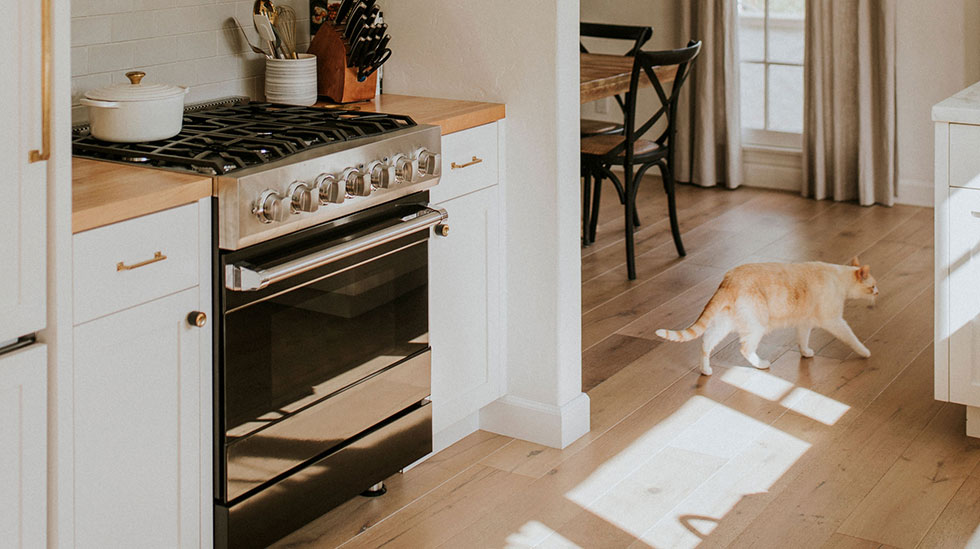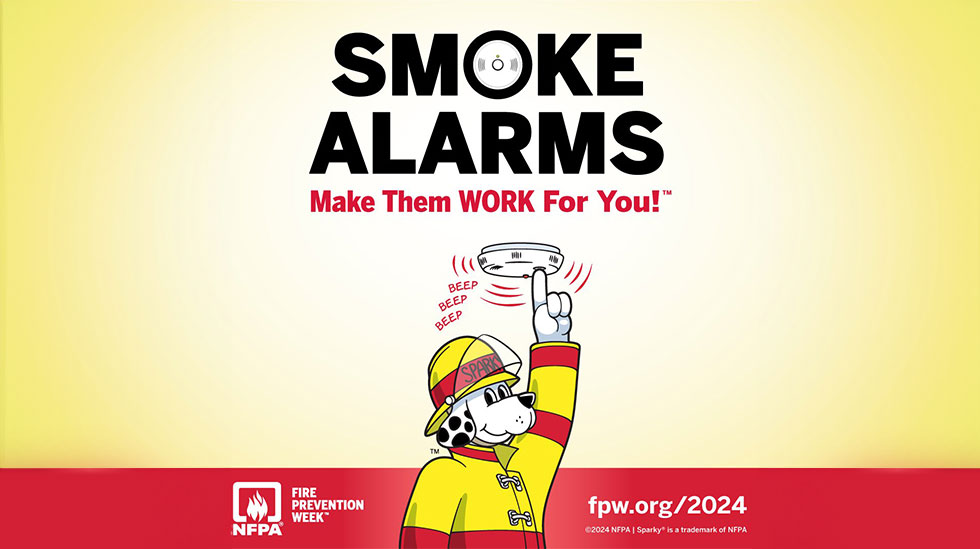Whether you’re a new homeowner or a repeat buyer, the preparation for your new home doesn’t stop once you’ve moved in. Now’s the time to prepare for the things you can never actually prepare for—that’s what Fire Prevention Week is all about.
Falling on October 6-12, 2024, Fire Prevention Week focuses on bringing awareness to and educating the community on fire safety and prevention at home. Each year during the annual observance, fire departments across the country stop by schools for assemblies and conduct demonstrations to provide children, adults, and teachers lifesaving fire safety and prevention education to decrease casualties caused by fires.
We’re joining the call to educate homeowners about the history of Fire Prevention Week, but we’re not doing it alone. We’ve enlisted the help of Ben Campbell, a Lieutenant with the North Liberty Fire Department and the son of our very own Urban Acres agent, Chris Campbell Boddicker!
Meet the Expert
 Lieutenant Campbell is a longtime resident of Johnson County, having lived in North Liberty for 10 years and previously in Iowa City.
Lieutenant Campbell is a longtime resident of Johnson County, having lived in North Liberty for 10 years and previously in Iowa City.
“I always knew that I wanted to do something in public safety, ever since I was a little kid,” explained Campbell. “Serving my community and helping others has always been my calling. I wouldn’t change it for the world.” After turning 18, he joined the North Liberty Fire Department, where he has been the last four and a half years. Campbell is also a Captain with the Swisher Fire Department and an EMT with Johnson County Ambulance Service.

History of Fire Prevention Week
The event is recognized each year during the week of October 9, in commemoration of the Great Chicago Fire. The blaze spanned from October 8-October 10, 1871, causing a devastating 300 deaths, leaving roughly 100,000 people homeless, and destroying over 2,000 acres of the city.
On the 40th anniversary of the fire, the International Fire Marshal’s Association decided that the event should be observed in a way that would keep the public informed about the importance of fire prevention. The NFPA then began annually observing Fire Prevention Week in 1922 before becoming the longest-running public health observance in the county, being proclaimed a national observance by President Calvin Coolidge in 1925.
2024 Fire Prevention Week Theme
Each year, the NFPA releases a theme that serves as the educational area of focus. This year’s theme: Smoke alarms: Make them WORK for you! Previous themes have included: Cooking Safety Starts with YOU. Pay Attention to Fire Prevention. (2023); Fire Won’t Wait, Plan Your Escape (2022); and Learn the Sounds of Fire Safety (2021).
Roughly three out of five fire deaths happen in homes where smoke alarms are nonfunctional or absent. While the devices may not be able to prevent fires, with the quick spread of flames, smoke alarms can substantially decrease risk by giving people a chance to escape. That’s why this year’s campaign focuses on a single 3-step call to action with smoke alarms: INSTALL, TEST, and REPLACE.
INSTALL smoke alarms in every bedroom, outside each separate sleeping area (such as hallways), and on each level (including the basement) of the home.
“Homeowners should TEST their smoke alarms at least once a month,” says Campbell. “This is really important because smoke alarms are crucial to notifying you that there may be a fire in your house!”
REPLACE all smoke alarms when they are 10 years old or stop responding when tested.
Another key aspect of making smoke alarms work for you is making sure you have devices that fit your needs. According to the National Institute of Health, one in eight people in the United States (13 percent, or 30 million) aged 12 years or older has hearing loss in both ears, based on standard hearing examinations. Those numbers increase, eventually reaching 55% of adults ages 75 or older with hearing loss in both ears. For hearing-impaired individuals, there are a variety of special alarms, devices, and accessories that can help ensure everyone in the house will be alerted in case of fire or high CO levels. Options can include devices with strobe lights that will flash when the alarm sounds, or even a pillow or bed shaker device that is activated by the sound of a standard smoke alarm.
For children or household members with sound sensitivity, there are also options with low-frequency sounds or even voice alarms that can play a message on exactly what to do and where to go. No matter what type of alarms and devices you use, the most important thing is making sure everyone in your household knows what the alert sounds, looks, or feels like, and what to do when it goes off.

Knowing Your Escape Plan
Fire is fast. In less than 30 seconds a small flame can become a major fire, become life-threatening in as little as two minutes, and in some cases even engulf a home in flames within 5 minutes. Once you are signaled to a fire, you have to get out as soon as possible.
“The most important thing when creating a fire escape plan is to make sure that you practice it and that it is simple enough that you will remember it,” explains Campbell. “Make sure that you know your escape routes, identify a meeting place, and know how you are going to call for help.”
When crafting a fire escape plan, here are some tips and considerations:
- Your home’s floorplan: If there are multiple levels, there should be an escape plan for each level
- Windows and doors that can aid or prevent escape
- Check for heat: If you need to use door handles to escape, use the back of your hand to feel the door handle for heat. If it’s hot—don’t open!
- This is also why, if possible, you should know at least two ways out of every room.
- Have an outside meeting place that’s a safe distance from the home
- Incorporate your pets into your plan
- One good way is to have collars and leashes handy by your escape exits
In the event of a fire, there are a handful of items that are helpful to have accessible. “If your home has multiple floors, I’d recommend having an emergency escape ladder. This is something that can be really helpful if you aren’t able to access the first floor of your home,” explains Campbell. He also recommends a fire blanket that can be stored in your kitchen or by your fireplace, as well as carbon monoxide detectors on each floor.
If you’re not in the habit of closing your bedroom door before bed, it’s time to start! Campbell says one of the most important sayings in fire safety is ‘close before you doze.’ This is because the simple habit can actually buy you time to escape and get to safety in the event of a fire while you’re asleep.
The NFPA indicates that 71% of Americans have a home fire escape plan, but only 47% have practiced it. You know what they say—practice makes perfect. By practicing and perfecting your escape plan, you’ll be able to reduce panic, helping you in case of an emergency. Experts say to practice your plan at least two times a year, preferably during the daytime and nighttime so your household can be prepared in any situation.

Safety Starts in The Kitchen
With more than half of all residential building fires originating from cooking, it’s safe to say that fire prevention should always be top of mind in the kitchen.
“The best thing you can do to prevent a cooking fire is to stay attentive in the kitchen,” says Campbell. We know accidents happen, so if you do end up with a cooking fire in front of you, first and foremost, always call 9-1-1.
“For grease fires, cover the pan to smother the fire, but no matter what, always make sure that you turn your stove burners off and that you have a fire extinguisher easily accessible in your kitchen.”
More safe cooking tips in the kitchen include:
- Never leave your stove unattended
- Wear short, close-fitting, or tightly rolled sleeves and clothing.
- Turn pot handles toward the back of the stove (this helps so that no one can bump into them!)
- Keep a pan lid or baking sheet nearby (to help smother a fire)
For more fire and safety tips, don’t hesitate to reach out to your local fire department—they’re the experts! If you’re in North Liberty and are interested in a fire safety lesson at a school or event, or a fire station tour, you can submit a request here.






